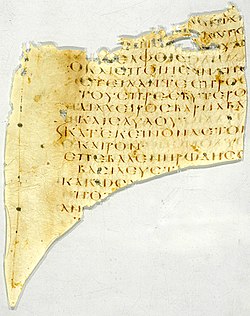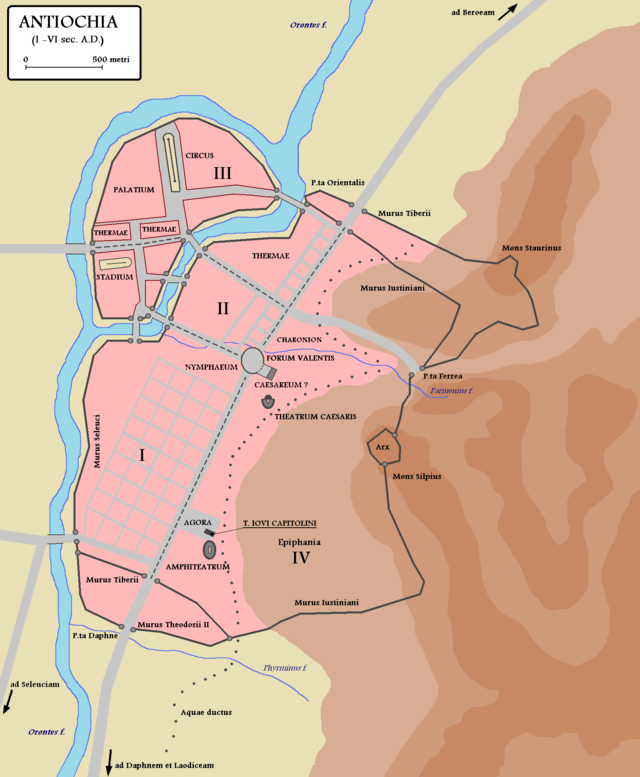Loading AI tools
Chapter of the New Testament From Wikipedia, the free encyclopedia
Acts 11 is the eleventh chapter of the Acts of the Apostles in the New Testament of the Christian Bible. It records that Saint Peter defends his visit to Cornelius in Caesarea and retells his vision prior to the meeting as well as the pouring of Holy Spirit during the meeting. The book containing this chapter is anonymous but early Christian tradition uniformly affirmed that Luke composed this book as well as the Gospel of Luke.[1]
| Acts 11 | |
|---|---|
 Acts 11:29–12:2 on the recto side of Uncial 0244 (Gregory-Aland) from the 5th century. | |
| Book | Acts of the Apostles |
| Category | Church history |
| Christian Bible part | New Testament |
| Order in the Christian part | 5 |
The original text was written in Koine Greek. This chapter is divided into 30 verses.
Some early manuscripts containing the text of this chapter are:
This chapter mentions the following places:

Some church members, identified as 'circumcised believers' (Acts 11:2), objected to the reception of Gentiles into the church, using precisely the kind of 'discrimination' that Peter was warned against in Acts 10:20 (cf. Acts 11:12), on the issue of the 'traditional restrictions on table-fellowship between Jews and Gentiles' (as Peter himself referred in Acts 10:28), that was significant in the early church as written by Paul in Galatians 2:11–14[broken anchor].[5] Peter emphasizes 'the role of the Spirit, the importance of not 'making a distinction' (verse 12), and the parallel with Pentecost (verse 15)' in relation to Jesus' words (verse 16; cf. Acts 1:5). He warns that 'withholding baptism from the Gentiles would be tantamount to hindering God' (verse 17), because each step in the development of the church is initiated by God.[5]
These six fellow believers are not identified, but John Gill suggests it was "a very wise and prudential step" on Peter's part to take them with him from Joppa to Caesarea and from there to Jerusalem, anticipating that once in Jerusalem he might "be called to an account for his conduct".[7]
The words "them" and "us" emphasize the parallel of the two cases (cf. Acts 11:15), for just as faith existed before the gift of the Spirit in the case of Peter and the Apostles, so in the case of Cornelius and his companions there should exist a degree of faith, otherwise the gift was not manifested in them.[9]
This concludes the "unified and tightly constructed episode of Cornelius' conversion".[5]

This section extends Acts 8:1 ("those who were scattered", following Stephen's death), as the traveling disciples "[speak] the word" or "preach the word" (verse 19; cf. Acts 8:4) to the Jewish population over a wide region (Phoenicia, Cyprus). It then focuses on the development of the early church in Antioch in Syria (c. 300 miles (480 km) north of Jerusalem).[5]
The reference to "the persecution that followed Stephen's death",[5] picks up the Greek wording ἐπὶ Στεφάνῳ (epi Stephanō), which has been interpreted as meaning either "after" or "on account of" the stoning of Stephen.[11][12]
In Antioch, some of the believers started preaching also to "Greeks" (verse 20; Greek: Ἑλληνιστάς, Hellēnistas, "Hellenists"; some manuscripts, such as Papyrus 74, have Ἑλληνάς, Hellēnas, "Grecians"), a development from the earlier Cornelius episode.[5] The apostles reacted to the news (verse 22) similar to that in Acts 8:14, but this time they first sent Barnabas (introduced in Acts 4:36) who plays important roles as the liaison to the church in Jerusalem and as the one who brings Saul (or Paul) from Tarsus (verses 25–26) to spend a year quietly engaged in 'teaching'.[5]
The sending of help for the famine in Judea (during the reign of Claudius, 41-54 CE) raises up some historical difficulties:[5]
Seamless Wikipedia browsing. On steroids.
Every time you click a link to Wikipedia, Wiktionary or Wikiquote in your browser's search results, it will show the modern Wikiwand interface.
Wikiwand extension is a five stars, simple, with minimum permission required to keep your browsing private, safe and transparent.